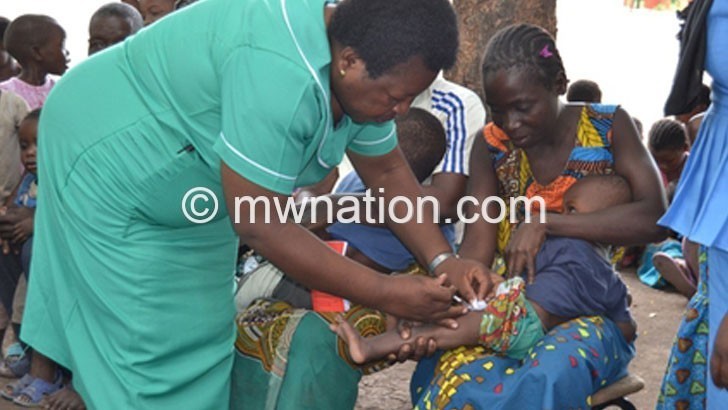Celebrating two years of malaria vaccine
Clara Magalasi, 35, from Nkhwambala Village, Traditional Authority Kalolo in Lilongwe District raised her first two children with many challenges as they suffered malaria every three months.
This would disturb her business and she failed to take care of her home as she spent much time in hospital.

Magalasi says: “The hospital was my second home. I had to abandon my businesses for a long time whenever my child was admitted.”
Luckily, she never lost any of the children to the fatal disease which was responsible for 36 percent of all outpatient visits, 46 percent of all in-patient cases, and 24 percent of all in-patient deaths in 2016.
Magalasi’s predicament, however, paints a picture of how malaria is making the lives of infants difficult as it is sending most of them to early graves.
Following such cases across sub-Saharan Africa, the World Health Organisation (WHO) partnered the Malawi Government to introduce a malaria vaccine.
The vaccine was introduced by the Ministry of Health on April 11 2019 and after four months, positive results were registered as cases of children diagnosed with malaria dropped in most health facilities.
In Malawi, the Expanded Programme on Immunisation is leading the phased introduction of the malaria vaccine in areas where transmission is the highest.
The vaccine programme aims at vaccinating 120 000 children every year for three years in selected areas to determine how best to deliver the required four doses of the vaccine in routine settings.
Magalasi says in 2019 she gave birth to a daughter who was privileged to get her first dose of the malaria vaccine when she reached five months.
“After taking the first dose I saw something different. Unlike my other children who at her age were frequently sick, the only sickness this child has had is cold and flu.
“I have never been in the hospital for more than an hour but in the past with my other children it took weeks and months,” she says.
The story of Magalasi relates to that of Florida Noel, 28, from Nselu Village, Traditional Authority Kalolo in Lilongwe District. Her first child was also getting sick frequently.
“Life was tough. From that experience, I started taking a leading role in advocating for safe motherhood in my community.
“I am now an advocate who sensitises women on the importance of getting their children vaccinated for malaria,” says Noel.
She says initially women were reluctant to get their children vaccinated as they believed various myths that surrounded vaccines such as that children would become infertile when they reach child-bearing age.
Noel says: “There were a lot of funny stories, but whenever I tell them my story and how healthy my children are after vaccination and following malaria prevention measures, they believed it and took their children to the hospital.”
Chileka Health Centre senior health surveillance assistant Hexter Chisamba says two years after the vaccine was launched, the progress has been good and women are no longer missing the subsequent doses.
He says: “As you are aware, this vaccine is being administered in four phases. The first dose is given at five months, second dose at six months, third dose at seven months and the last dose at 22 months.
“We have tried to make women come for the doses to follow the entire schedule and it seems to be working out.”
Chisamba says community volunteers also help them in advocating for the vaccine which has eased their work as most women are now aware of it.
He says: “There has been a tremendous change. Most under-five children are no longer coming to the hospital due to malaria unlike those who are over five. To us this is a great achievement as we used to lose most of these young children to malaria.
“We hope to see this vaccine rollout across the country because we have seen good things happening and I believe it is the best way to save the lives of many young children in Malawi.”
National Malaria Control Programme national coordinator John Sande says a child’s progress is monitored through a register and defaulters are traced and put back on the dose.
He says: “The main challenge was on the final dose because parents relax a lot due to the huge gap that is there. But with sensitisation and reminders there has been a change in these two years as most children are now getting all the doses.”
Health rights activist Maziko Matemba says as the world celebrates Malaria Day on April 25 2021, Malawi needs the malaria vaccine to rollout as the disease has been a major cause of under five children deaths.
According to the WHO, malaria is among the top 10 causes of death in Malawi and has a huge burden over the country’s health system with about 30 percent hospitalisations in its health facilities.
The vaccine is a complementary malaria control tool being added to the existing preventative measures of sleeping in treated mosquito nets, indoor insecticide sprays and timely testing and treatment.
If all doses are correctly administered, the vaccine is tested and proven to be capable of reducing malaria related infants deaths by four percent.





